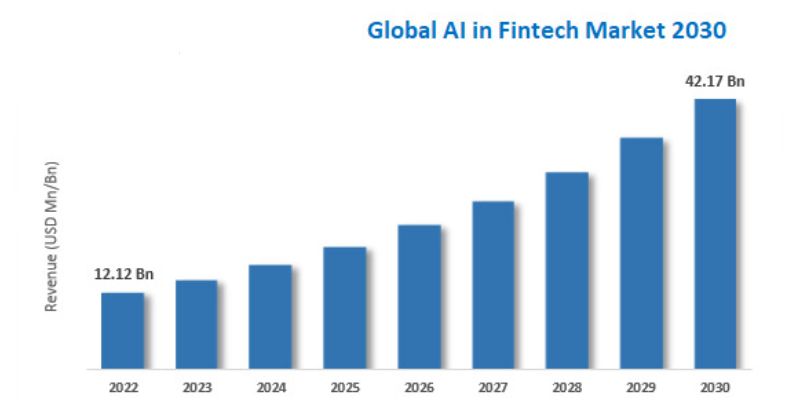Suppose you step into a bank where a robot guides you with all the finance-related queries. Or the robot can suggest an effective investment plan by viewing your activities. This is where AI in Fintech has the potential to make that very thing a reality. Digital transformation in the fintech industry gives direction to “Fintech,” innovative solutions created to upgrade banking services.
Uniting Fintech App Development Solutions with AI, a revolutionary technology, they tend to witness a huge advancement. The reports from GlobeNewswire depict that embedding generative AI in Fintech market is estimated to reach 19,963 million USD by 2032, making it a well-known transformation in the future of Fintech App Development.
Still, a lot of people are thinking about merging AI into Fintech, largely needing to discuss generative AI in this context. The article explores artificial intelligence, including its advantages, business applications, and the reasons your financial institution can profit from hiring a Fintech App Development Company.
How is AI Integrated in the Fintech Sector?
Managing voluminous data manually is impossible and full of struggles. Collection, reserving, and data organisation by humans increase the chances of errors. However, these issues can be removed with AI-based fintech solutions. AI offers banks the flexibility requested in the currency scenario. When AI in Fintech come along, the workflow becomes optimised to make sure accurate and relevant outcomes are generated. AI offers much more than convenience to users today. These AI tools, combined with data analytics, offer valuable insights in an organised way. This is an easy way for providers to personalise suggestions that align with users' spending or investing limits. AI in Fintech also completely secures the system, in any case, whether it is an integrated or to-be-integrated digital product.
AI’s Advantages in Fintech

There are numerous benefits of using AI in Fintech; it's no wonder that the majority of banking institutions are relying on AI Development Services.
Cost-Effective
According to McKinsey’s report, nearly 44% of businesses embrace AI technology to reduce total company prices. The Fintech industry can save millions in labour costs, assets, and capital with AI solutions. As far as labour cost is concerned, manual operations are costly and time-taking. By substituting these activities, automation through AI safeguards resources from being wasted. As AI solves most problems, customer support people need not spend too much money on recruiting employees. In relation to banking firms, AI helps in saving money in all required areas of operations. With AI, banks can draw clients and offer impressive deals.
Enhanced Customer Experience
As per the latest statistics and figures on AI, 62% of users leverage AI to increase customer experience. With AI Development making strides in banking and Fintech’s customer support, users are accustomed to getting replies at any time. To put transactions in place, banks should be available round the clock, 24/7. Virtual assistants and chatbots eliminate excess workload by addressing common issues. This allows ample time for the client service managers to manage complex requests. The assistance of AI in making a communication bridge with financial companies is an easy process. Satisfied clients get an opportunity to be a part of a successful and growing business.
Proper Analytics
Systems supported by Artificial Intelligence can assess data from numerous sources and forecast what is going to work or what is going to fail. AI can also help in the assessment of in-depth consumer data and gain insights into their needs, distribution techniques, and product development. Human analysts are incapable of comparing with the robust working of professional algorithms. Dissimilar to a person, an AI Development Company or service can review their inner workings and precisely understand the way a decision was taken.
Also Read: The Role of Artificial intelligence in Fintech App Development
Examples of AI Use Cases in Fintech
-
Financial Reporting
AI in Fintech have a significant role in the generation of financial reports. They can be effectively designed using AI and financial information. Banks and other firms contain extensive data sets, which are used in report generation after mindful research. After thorough data review, these reports should be produced, which takes a significant amount of time.
-
User Experience
There are hundreds of users working in financial firms. Catering to different needs without the involvement of AI development is a huge commitment. Customization can boost the brand image and confidence of users in the business. Once clients download banking applications, AI platforms collect and assess user data. Fintech App Development Services, guided by AI, can help customers track their spending patterns and economic goals. Analysing AI transcripts can reveal a customer’s interest and show direction to the agents about the relevant solutions to offer.
-
Detection of Fraud
AI can rapidly respond to the supplied data and patterns or spot threatful and suspicious activities. This is particularly valuable in the banking industry, where there are too many digital transactions carried out on an hourly basis. It fosters cyber security and fraud prevention. Fraud analysts no longer need to engage in heavy work, which frees them from concentrating on complex issues.
-
Data Analytics
Millennials are now investing in the stock market on a large scale. This has directly increased the demand for AI Development Services that aid people in navigating the market properly. Many smartphone apps that are AI-backed can now examine past and current data about companies and related stocks. Moreover, they also help investors distinguish between good and bad investment choices.
-
Online Banking
Traditional banks, also referred to as incumbent organisations, face tough competition from novice players in the market, known as neobanks. Digital banking removes location barriers and provides all-time access to Fintech App Development Services, easing the banking processes irrespective of the region they live in. Apps and online spaces allow users to manage accounts, payment transfers, and other transactions from their device’s comfort. As the operations are automated, digital banking minimises operational prices. As a result, clients receive better interest rates and reduced fees, which raises the affordability of financial services.
-
RegTech
RegTech, which stands for regulatory technology, provides a compelling solution to the obstacles of aligning with protocols and preparing documents, which are exposed to human error and constraints. Chatbots that can provide regulatory advice, cloud-based systems that can handle compliance and regulatory data effectively, and creative computer code that makes processing regulatory data easier are a few examples of RegTech.
-
Robo-advisors
When robots and people team up, everyone benefits. Robots simplify and automate back-end office duties, freeing up humans to focus on more strategic and creatively oriented jobs. A wonderful example of an AI-based financial solution is robo-advisors.
Must Read: Robo Advisor Platform Development For Fintech Industry
Ongoing AI Trends in Fintech

AI is an influential way to enhance financial regulation without requiring extra staff in the office. Nevertheless, AI is capable of offering much more than you can imagine. It can make predictions related to money by learning the details of the Mobile App Development Company or prevent threats. The trends not only bring revolution in the fintech sector but also help users gain a remarkable and speedy experience.
Detection and Prevention of Fraud
Some fintech companies are using custom AI models exclusively to identify and stop fraud. Big language models are capable of pattern analysis and learning from the data. When an AI finds abnormalities in data, it labels the data as being out of order and sends it to the financial advisor for evaluation. AI enforces risk mitigation by analysing large amounts of data that can’t be manually handled, at least not in such a short span of time. In addition, as AI analyses data, it keeps developing and learning. It becomes significantly more accurate and better as a result. In addition to protecting clients, it could help a Fintech App Development Company avoid losing thousands of dollars to fraud.
Merging AI with Blockchain
Fintech firms are not only polishing existing processes but emerging with the aid of AI to stand strong in the competition. The combination of blockchain and AI in fintech sector makes it more transparent and safe from cyber hacks and leakage. Because the blockchain record is secure, integrating AI with it enhances its analytical capabilities and expands the pool of AI services available to a Fintech App Development Company. Suitable examples include smart contracts, high safety measures, and verification of identity. The striking union of AI and Blockchain can upgrade Fintech App Development Solutions and result in a superior infrastructure. Above all, it boosts confidence in the system and infrastructure and may even help avoid another global financial crisis.
Predictive Analytics
AI also gives companies different ways to analyse data to estimate credit scores. This aids users with zero credit history or minimal data access to inaccessible services. Now, AI can also detect information that was not employed to calculate dependability in the past. This might involve rent or bill payments. AI can deeply understand the risks and calculate credit scores more quickly than old solutions. In such a case, the companies cannot just enhance operational performance but also generate tailored Fintech App Development Solutions and other products for a vast clientele.
Upgrading Security with Biometrics and Voice
Artificial Intelligence is also used to protect users and their data through authentication techniques. Biometrics replace conventional techniques like passwords and PINs, providing the primary benefit of identity verification. Before having access to vital material, this offers a far more accurate means of confirming the identification. Transaction authorization is another way of shielding assets for users by embedding an extra layer of safety in every single transaction. The best instances of improved AI security are facial recognition and fingertip modelling. Utilising cutting-edge security techniques like behavioural biometrics and iris recognition, some finance companies can hire AI developers and even go one step further. These practices encourage real-time fraud detection and block unauthorised access.
Predictive Banking
Predictive banking is one of the most trending and advanced patterns observed in the fintech sector. Personalised Fintech App Development Services have reached greater heights since the time AI models were used to examine big data sets. AI models use data from several sources, including digital footprints (social media included), past transactions, and other sources, to create specific forecasts that can assist each consumer in receiving better advice. Not only this, but it can also predict big events for users, like taking out loans or purchasing a house.
Top AI-Powered Fintech Startups
1. ZestFinance
ZestFinance helps service providers perform credit modelling and risk profiling. The company uses machine learning to assist businesses in improving underwriting procedures, reducing credit losses, and raising acceptance levels.
The company's primary goal is to create an equitable system of finance. Its exclusive platform, Zest Automated Machine Learning, aids companies in evaluating applicants with little or no credit history.
2. Affirm
It is a consumer app that provides loans for buying from retailers, but a unique element of the platform is the execution of ML algorithms in underwriting. By assessing vast data, the company provides accurate credit decisions, which is significant for online transfers.
Customers can now divide their purchases into affordable payments over time thanks to Affirm's recent selection as Amazon's official buy now, pay later partner. Affirm has a range of features that enhance user experience, like no hidden costs and flexible pricing.
3. Bud Financial
Bud Financial has designed a platform for open banking, allowing users to access financial information on any product. The firm prioritises data security above all else and employs encryption methods to safeguard user information.
Furthermore, Bud is designed with privacy in mind, using only private information to train its machine-learning algorithms. Bud strongly emphasises accountability and transparency. It works very well on its processes and makes sure that the customers are aware of why and how it leverages data.
4. Kasisto
Kasisto has created its special AI-supported interactional platform, KAI, which has stood out in the finance market. KAI is upfront about helping banking firms reduce traffic at contact centres by offering self-service options.
Users are now able to access account details and initiate payments without manual interruption. Chatbots with AI capabilities examine client information and offer customised financial advice to assist users in making wise choices related to Fintech App Development Solutions.
5. Vectra AI
It is a cybersecurity-driven startup firm that uses AI’s strength to recognize and remove threats in a Fintech App Development Company. The platform that detects cyber fraud is named Cognito. It automates risk detection, extracts hidden hackers targeting valuable details, and identifies compromised details as well.
Especially when it comes to financial institutions, it can detect hidden offenders. The powerful machine-learning algorithms it employs are capable of identifying tiny trends in both user behaviour and network traffic. This ultimately reduces the timeframe of response and expands the effectiveness of cybersecurity processes.
HighRadius
SaaS FinTech app development company HighRadius automates payroll and accounts receivable procedures with the use of AI-powered autonomous systems. It provides autonomous software and modified cash treasury and record-to-report processes.
It delivers predictable business results, such as reduced bad debt, enhanced productivity, DSO reduction, and working capital optimization, within six months, using AI development to modernise complicated financial operations.
Challenges of Integrating AI in Fintech
Inadequate Data
For appropriate analysis, AI models depend on top-notch present and old data, like transaction details, company financials, and personal details. But, in a novice company, there might be limited resources to fulfil the purpose of model training. Data might be improper or corrupted, which can pose hurdles in the integration of AI Development Services. An effective way to handle this issue is to use techniques of synthetic data generation so that one can imitate the realistic patterns to augment the set of data, offering samples for enhancing model operation. Once the complete data is gathered, the next challenge with AI in fintech is figuring out what kind of data is appropriate.
No Standardisation of Data
AI-based algorithms collect and analyse data from different sources and formats. While standardised data enables more efficient analysis and results, certain algorithms are still capable of processing this kind of data. It is critical to cut off:
-
Cut off data format deviations that may arise as a result of various date patterns, currencies, or accounting procedures, as per national requirements.
-
Missing information can occur as a result of system issues or limitations on privacy.
-
Features that require scaling to a particular format as AI models are reliant on numerical inputs to recognize the connections between features.
Data Supplement Issues
More than simply simply obtaining financial data is required. It is essential to set up a smooth process to receive data. A vital component here is data drift, where the statistical traits of the data are dynamic and change with time. The common cause of data drift in Fintech is client behaviour or market dynamics. Data supplementation is critical in fields like fraud detection, risk assessments, and prediction of the stock market. If the data becomes outdated, it can result in suboptimal performance. To resolve this issue, one can supplement an old dataset via the integration of API that allows the collection and merging of new information from several sources.
Choosing and Evaluating Model
Fintech App Development is a plethora of apps, like algorithmic trading, credit scoring, customised financial suggestions, risk assessment, and distinct AI and ML models, which are needed for every kind of software. Every model is associated with the concerned ups and downs. A mobile app development company should consider these points when choosing a functional AI model:
-
Check what issues should be addressed via AI, such as risk management, investment forecasting, algorithmic trading, customer service, or credit scoring.
-
Access, analyse, and systematise the complete financial information you possess.
-
Look for two or three different models and test them, after which you need to choose the best one.
-
Ensure the models align with our native country’s regulatory needs.
-
The AI model should be highly scalable to cover all the possible customer demands and data flows.
-
Hire dedicated developers or consult professionals for guidance in executing the technologies and conquering typical AI-related obstacles in finance.
AI Talent Shortage
It is not abundant to design AI solutions for the fintech sector, so companies need to hire expert mobile app developers to make the solutions work successfully. Unluckily, there is a need for more skilled AI talent, and financial organisations are feeling the pinch. Graduates with skillful AI capabilities are hard to find today. Also, startups face high competition from well-established companies with ample resources. A skill gap can be noticed in the needs presented by the industry, and the AI professionals showcased. Businesses working in the sector of Fintech App Development Services should frame strategies when recruiting AI developers to come into the picture. The firms should offer competitive salaries and provide training to outshine the heavy competition. Furthermore, corporations may choose to hire AI developers from different industries or IT firms by looking outside of their own.
Conclusion
Fintech has completely changed the financial services sector by using artificial intelligence (AI), which has dramatic advantages but drawbacks as well. As evidenced by its many applications, which vary from fraud detection and customer service automation to risk management and customised financial advising, artificial intelligence plays a critical role in enhancing customer experience and operational efficiency. The need for robust cybersecurity measures, legal compliance, and data privacy concerns are some of the barriers that prevent AI from being used in Fintech. In order to create frameworks that guarantee moral AI use and data protection, financial institutions and developers must work together to address these difficulties. AI will have an enormous effect on the delivery and consumption of fintech app development services worldwide as its capabilities advance, stressing its vital function in determining the direction of the financial industry.














Share this blog